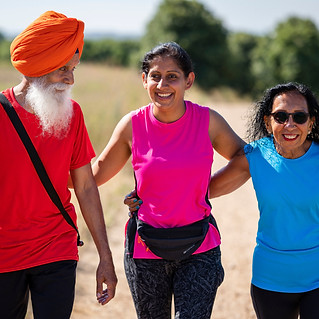
Self-care for loneliness
How can we use self-care techniques for loneliness?
Self-care is a common phrase these days when it comes to our general wellbeing, but it can apply to loneliness too. You might not be sure what the term ‘self-care’ means but chances are you’ve done it already in your life without realising. The Oxford Dictionary defines self-care as ‘the practice of taking action to preserve or improves one’s health’, whether that be mental, emotional or physical. Self-care is different for different people but the concept is the same: the idea of taking time to do things that nurture, de-stress and support you. Loneliness can affect us on many levels, so here are our top five self-care tips.
Write a to-you list
Loneliness can make us view ourselves more negatively. We tend to spend more time ruminating and casting a microscopic gaze on all our perceived failings; whether we are likeable or lovable enough, things we think we’ve done wrong, whether we are good at our jobs etc. Instead, draw up a positive To-You list celebrating all the good things about yourself. It could be what you’re good at, what your friends and family say are your best qualities, compliments people have paid you in the past, what you have been most proud of in your life and all your achievements.
Start a gratitude diary
There are many studies showing how regularly expressing gratitude can lead to increased positive mood and lower levels of anxiety, depression and loneliness. Write about any good or nice things that have happened to you in the last week, even if it’s something like enjoying a cup of tea in the sun, retrieving positive memories or being grateful for someone or something in your life.
There are always things to celebrate, no matter how small. Writing a list of all the good things about you and your life will help keep your loneliness in perspective.
Make yourself some comfort food
By comfort, we don’t mean sugary snacks and junk food, but fresh, nutritious and filling foods that leave you feeling good. Research shows that people who are lonely are less likely to look after themselves and eat well. Loneliness can affect our sleep and energy levels, so making sure we have a balanced and enjoyable diet is important. Taking the time to prepare a nice meal for ourselves, even if it is just a sandwich with all your favourite ingredients, is one of the simplest and nicest forms of self-care we can do for our bodies (and our brains). Food for thought…
Take a hot bath or shower
This might sound strange but researchers from Yale University found that having a hot bath or shower can act as a substitute for a companion and can actually dispel feelings of isolation and exclusion. The study found that feelings of social warmth could be sparked by experiences of physical warmth. Even holding a glass or mug of a hot drink can make someone more trusting and generous towards others. So next time you are feeling lonely, or that the world doesn’t feel like a very friendly place, do something that will warm you up.
Create a nurturing environment
The absence of touch can be a significant factor in loneliness. Make your home a nurturing sanctuary that appeals to your senses in other ways. Invest in tactile soft furnishings like comfy cushions and cosy blankets. Scented candles that smell calming or uplifting are also a good way to nourish your senses. Have bright or uplifting visual mementoes around you like inspiring photographs or paintings that you like, as well as postcards that remind you of good times and happy memories. Brighten your home with cheery or beautiful vases of flowers. Bring nature into your home as well, plants are well known for their health benefits. Peace lilies, Boston Ferns and Gerbera Daisies are all great for relieving stress and detoxifying the air.
Do something different
Self-care can also be action-orientated. When you have lots of time on your hands, try filling it with new things. What hobbies can you start or old ones you can take up again? Are there any local clubs or societies you can join? If leaving the house is difficult you could find an online group that matches your interests. Actively engaging in something is different from distracting ourselves from feeling lonely; for example, going on social media or mindlessly watching TV. Meeting new people and learning new things are both active forms of self-care that can really make a difference.
See your loneliness as a blank slate
Changing our perception of loneliness can have a game-changing effect. Instead of seeing loneliness as something empty, or a lack in your life, imagine it as a blank slate on which to build new experiences, friendships and interests. It might take a bit of effort when you’ve been feeling a certain way for so long but keep going. We’re not defined by what happens to us in life but how we react - and putting a positive take on our loneliness definitely helps!
.png)



.jpg)